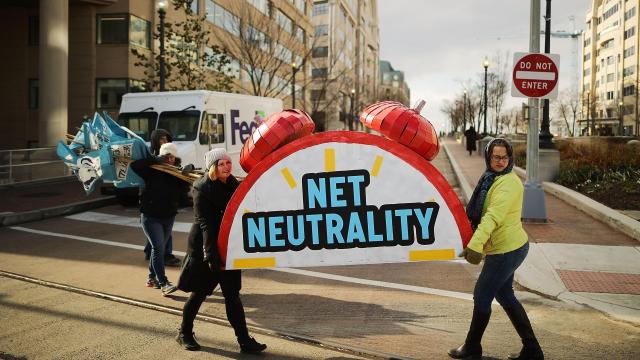Do you remember net neutrlaity? It may seem like ancient history now, but there was a time when regulators actually came together to put in place guardrails preventing greedy telecoms from segregating internet access to the highest bidders. Then Trump and Ajit Pai happened. Now, nearly five years after the Federal Communications Commission voted to gut net neutrality protections, a handful of Democratic lawmakers are working to codify the protections into law.
This week Democratic Senators Ed Markey and Ron Wyden introduced the Net Neutrality and Broadband Justice Act, which would officially classify broadband as an essential service. With that categorization in place, the lawmakers say the FCC would then be empowered to enforce net neutrality rules banning throttling and other discriminatory deeds deployed by internet providers. Additionally, according to Markey, the bill would grant the FCC the ability to enact broadband policies, that “increase accessibility, close the digital divide.”
What is net neutrality?
For those still confused over the lingo, net neutrality refers to rules and regulations intended to encourage equal access to the internet. Under these rules, internet service providers would be prohibited from creating internet “fast lanes” or granting certain companies or individuals preferential treatment. Net neutrality supporters argue those protections would essentially outlaw the blocking or throttling of internet traffic by mobile or broadband providers.
The new bill would make law an issue President Joe Biden’s administration has promoted since the early days of his presidency. Last year, Biden signed an executive order directing the FCC to reinstate Obama-era net neutrality protections. Biden also hired Tim Wu, the man who literally invented the term net neutrality, and appointed him as a special assistant to the National Economic Council. For bureaucratic reasons too complicated and convoluted to suss out here, the FCC still remains politically deadlocked despite Democratic control of Congress and the presidency. That makes regulatory movement on net neutrality at the FCC level all but impossible. This bill would sidestep that regulatory bullshit by codifying net neutrality into law.
The bill has already gained the support of numerous lawmakers, at least two FCC commissioners, and over a dozen digital rights groups including Access Now, the American Civil Liberties Union, the Electronic Frontier Foundation, GLAAD, and the Centre for Accessible Technology.
“Internet is an essential service, and our regulations should reflect that,” digital rights group Fight for The Future said in a statement supporting the legislation. “Just like gas and electricity, reliable high-speed internet is critical to participating in daily life.”
“The pandemic made clear internet access is no longer a luxury, but a necessity — and that consumers don’t just need broadband, they need to be able to hold their providers to account,” FCC Chairwoman Jessica Rosenworcel said in a statement. “After all, everyone should be able to go where they want and do what they want online without their broadband provider making choices for them,” said Rosenworcel. “I support Net Neutrality because it fosters this openness and accountability. While I trust the FCC has the authority it needs to adopt Net Neutrality rules, legislation that helps ensure it is the law of the land is welcome.”
The case for internet as an essential service
During an AMA on Reddit Thursday night, Senator Markey cited Verizon’s throttling of firefighters’ data speeds during a major wildfire in Northern California several years ago as a chief example of the consequences of killing off net neutrality protections in the first place. During the 2018 incident, Santa Clara County fire chief criticised Verizon publicly for throttling his department’s communications even though the department had paid for “unlimited data.”
The FCC’s decision to repeal net neutrality meant that it had no authority to investigate and potentially penalise Verizon for impeding the emergency responders. The FCC claimed that responsibility had merely been handed over to the Federal Trade Commission, but experts said the FTC also lacked the authority to ban throttling or upselling during an emergency.
“Net neutrality would ensure there are critical public safety and emergency communication protections that stop this from happening,” Markey said.
Markey added that when COVID-19 hit, “the FCC had NO ability to regulate broadband. We had no ability to force broadband providers to do the right thing. We just had voluntary commitments. This is unbelievable.”
